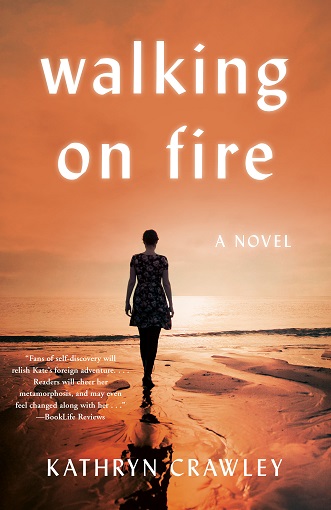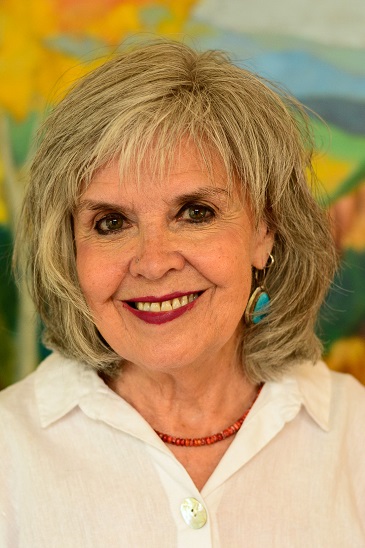One of my favorite aspects of writing this novel, however, was getting to develop scenes bringing to life beloved people who are no longer alive. I can visit them anytime I open my book.
Kathryn Crawley – 18 June 2023
The Back Flap
Greece. Politics. Love. Danger. Reeling from a failed marriage and spurred on by a burgeoning sense of feminism, twenty-five-year-old Kate accepts a position as a speech therapist in a center for children with cerebral palsy in Thessaloniki, Greece. It is 1974, and the recent end of Greece’s seven-year dictatorship has ignited a fiery anti-American sentiment within the country. Despite this, as her Greek improves, Kate teaches communication to severely disabled children, creates profound friendships, and finds a home in the ancient and historied city. From a dramatic Christmas pig slaughter to a mesmerizing fire walking ceremony, her world expands rapidly—even more so when she falls in love with Thanasis, a handsome Communist.
Through Thanasis, Kate meets people determined to turn a spotlight on their former dictators’ massacre of university students, as well as their record of widespread censorship and torture of dissidents. The more she learns, the more her loyalty to her country and almost everything she was taught in her conservative home state of Texas is challenged. Kate is transformed by her odyssey, but when her very safety is threatened by the politics of her lover, she must choose: risk everything to stay with Thanasis and the Greece that has captured her heart, or remove herself from harm’s way by returning to her homeland?
About the book
What is the book about?
Walking on Fire is a coming-of-age love story set in the land of exotic beauty and ancient civilization that is Greece. Themes of self-discovery, revolutionary politics, patriotism, love, betrayal, and forgiveness are explored amidst glasses of retsina, beaches with azure seas, and nights of Greek dancing. The novel is about trusting fate and learning to live and love in a new way.
When did you start writing the book?
Although I’ve been writing stories about my own experiences in Greece as soon as I returned to America in 1976, the writing morphed from memoir to novel in 2017.
How long did it take you to write it?
Five years. I began writing the novel in 2017 and completed it in 2022.
Where did you get the idea from?
The setting of Thessaloniki, the characters, and some of the early scenes were loosely based on my own experiences from 1974, interspersed with fictional events. A religious fire walking ritual, however, when my protagonist is suddenly abandoned by her lover, was the jumping off point for a wild ride into fiction. It was fun to create personas from my original characters and see where they took me, as well as to see where my protagonist would land at the end of the novel.
Were there any parts of the book where you struggled?
When a foreign language is an integral part of a book, it becomes problematic to determine how to transliterate that language and how to avoid alienating readers with too many foreign words. My protagonist comes to an unfamiliar land with minimal Greek language skills. As a speech pathologist working at a center for cerebral palsied children, she must learn the language herself, all the while teaching verbal skills to her students. The technical aspects of portraying the Greek language, which was in itself something of a character, was problematic.
What came easily?
Re-creating favorite events that had long resided in my mind.
Are your characters entirely fictitious or have you borrowed from real world people you know?
There are a combination of real world people, some of whom continue to be an important part of my life, and others made up entirely to move the narrative forward. Coloring outside of the lines of familiar people, creating darker shadows and new motivations, was really fun. One of my favorite aspects of writing this novel, however, was getting to develop scenes bringing to life beloved people who are no longer alive. I can visit them anytime I open my book.
We all know how important it is for writers to read. Are there any particular authors that have influenced how you write and, if so, how have they influenced you?
Your readers may laugh at this answer: Carolyn Keene, the pseudonym for the stable of writers for the Nancy Drew series. My protagonist must escape dangerous situations and find her own way in a sometimes hostile foreign land. My brother calls this book “Nancy Drew Meets Zorba the Greek,” however my novel is much more complicated: the re-emergence of democracy following a right-wing dictatorship; dizzying romantic love in the heyday of feminism; the conflict of an expatriate’s love for her country as she learns hard facts about US collaboration with the dictatorship. I like to imagine that Nancy would have evolved and met the moment, as did my protagonist.
Do you have a target reader?
The BookLife Review recommends my book for fans of self-discovery, comparing it to Eat, Pray, Love. It is also an adventure story. Middle-age and retirement-age women who lived the turbulence of the 1970s and younger women curious about earlier days of feminism are a target. Male and female travelers alike often fall in love with Greece when they visit, however the lovely, cosmopolitan city of Thessaloniki may not have been on their itinerary, nor do they know the rich history of that part of the world. The colorful, explosive events of post-dictatorship Greece and twentieth century American foreign policy may draw in readers interested in politics and history. Additionally, therapists and families of physically challenged children will enjoy meeting a small group of Greek children with cerebral palsy. I hope Greek Americans will like reading about their homeland.
About Writing
Do you have a writing process? If so can you please describe it?
For more than twenty years, I have been in a weekly on-demand writing group and have become accustomed to taking a prompt and jumping into a 45 minute session of fast writing. This writing process proved helpful when working on my novel for daily sessions and figuring where the plot would lead next. I try to keep pen on paper or fingers on the keyboard and make myself—allow myself—to connect with my subconscious. I think that’s the really fun part of writing.
Do you outline? If so, do you do so extensively or just chapter headings and a couple of sentences?
No, I do not write by outline. I prefer to move chapter by chapter and be surprised by where the writing takes me.
Do you edit as you go or wait until you’ve finished?
Since my writing practice is one of on-demand writing, I write first and edit later. Having a critical editor on my shoulder, even if disguised as a muse, definitely stops the forward flow.
Did you hire a professional editor?
Through my hybrid publishing house She Writes Press, I hired a professional copy editor, although my writing teacher and some literate friends had already proofed my book. “You’re a good writer, but I’m going to make you even better,” she told me. A professional eye to catch repetitive word use, cliches, and excessive use of words like “that” was invaluable.
Do you listen to music while you write? If yes, what gets the fingers tapping?
Although I don’t listen to music while writing, I certainly used Greek music of the mid 1970s as an inspiration and memory-enlisting device.
About Publishing
Did you submit your work to Agents?
No. I had learned from friends and established writers of the time-consuming process of enlisting an agent to shop a book and the problem of finding a good match.
What made you decide to go Indie, whether self-publishing or with an indie publisher? Was it a particular event or a gradual process?
At a writing conference at SOMOS in Taos, New Mexico, I attended a session on publishing. I learned about smaller houses being bought by the larger houses, making publishing even more competitive. I announced to myself that I would “just self-publish.” After much research, I realized I didn’t have the technical skills or the requisite knowledge to self-publish, but learned about the hybrid process. I took a leap and applied to She Writes Press, and was vetted and accepted as one of their authors.
Did you get your book cover professionally done or did you do it yourself?
After submitting an extensive questionnaire to the artistic director at She Writes Press, I was given over forty images as possible covers and found one I felt conveyed the emotion and concept of my novel.
Do you have a marketing plan for the book or are you just winging it?
Because I have had no formal training in writing, every step I’ve taken with my novel has been brand new. Somedays I’ve felt that writing the book was easier than the publishing and marketing processes. I was encouraged by She Writes to work with a publicity firm and have been pleased with BookSparks and the assistance they’ve given me. This new world is not unlike learning a foreign language and being dropped into an exotic location, just as the protagonist in my novel.
Any advice that you would like to give to other newbies considering becoming Indie authors?
Do as much research as you can about publishing; talk to as many authors as you can; and keep yourself committed to placing yourself in your writing spot on a daily basis. There are many stories to be told, and one of them is yours. The writing and publishing journey is well worth all the twists and turns and anguish and joy you will find on your way.
About You
Where did you grow up?
My great-grandparents settled in the small West Texas cotton town of Lamesa in 1907, and I grew up there amid tumbleweeds, dust storms, and wonderful people.
Where do you live now?
I moved to Boston in 1977, after having been something of a gypsy, and have been happily planted here since. I live in the suburb of Belmont, next door to Cambridge, an always-interesting cultural magnet. Belmont has the feel of a small town, replicating my early years of a close community, yet the stimulation and excitement of nearby Boston is just a bus and subway ride away.
What would you like readers to know about you?
Despite my 43 year career as a speech pathologist, I have always been a writer and am now happy to call myself an author. Following retirement, I finally had the mental space to write. This has opened many new doors, both into the broader world and into a new world within myself. Greece continues to be a very important part of my life, and my speaking, reading, and writing skills in Greek keep growing, just as my relationships with my dear friends in Greece whom I met 50 years ago, which deepen with each visit, by phone or in person.
What are you working on now?
I’m currently writing blogs for my website and waiting for the next spark for something more substantial. Will it be from the 13 notebooks of letters home from my father who was a World War Two trumpeter in General Patton’s band, the first to play our national anthem on German soil after the defeat? Will it be the story of my great-grandfather as a vigilante in the wilds of Texas who gunned down a family member, an outlaw? Will my pen travel back to Greece for yet another adventure story? My writing process will let me know.
End of Interview:
For more from Kathryn Crawley visit her website and follow her on Instagram and Facebook.
Get your copy of Walking on Fire from Amazon US or Amazon UK.


